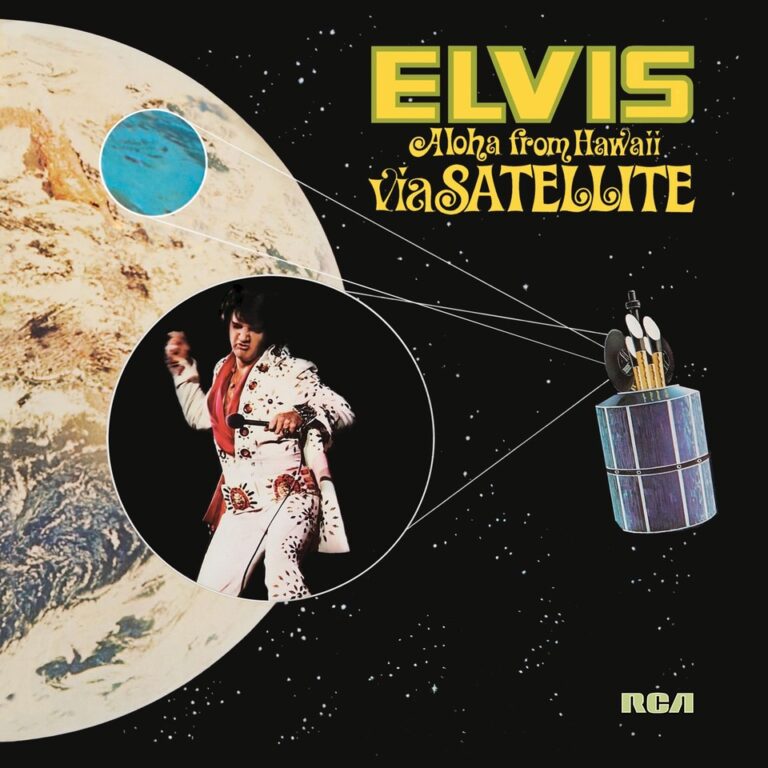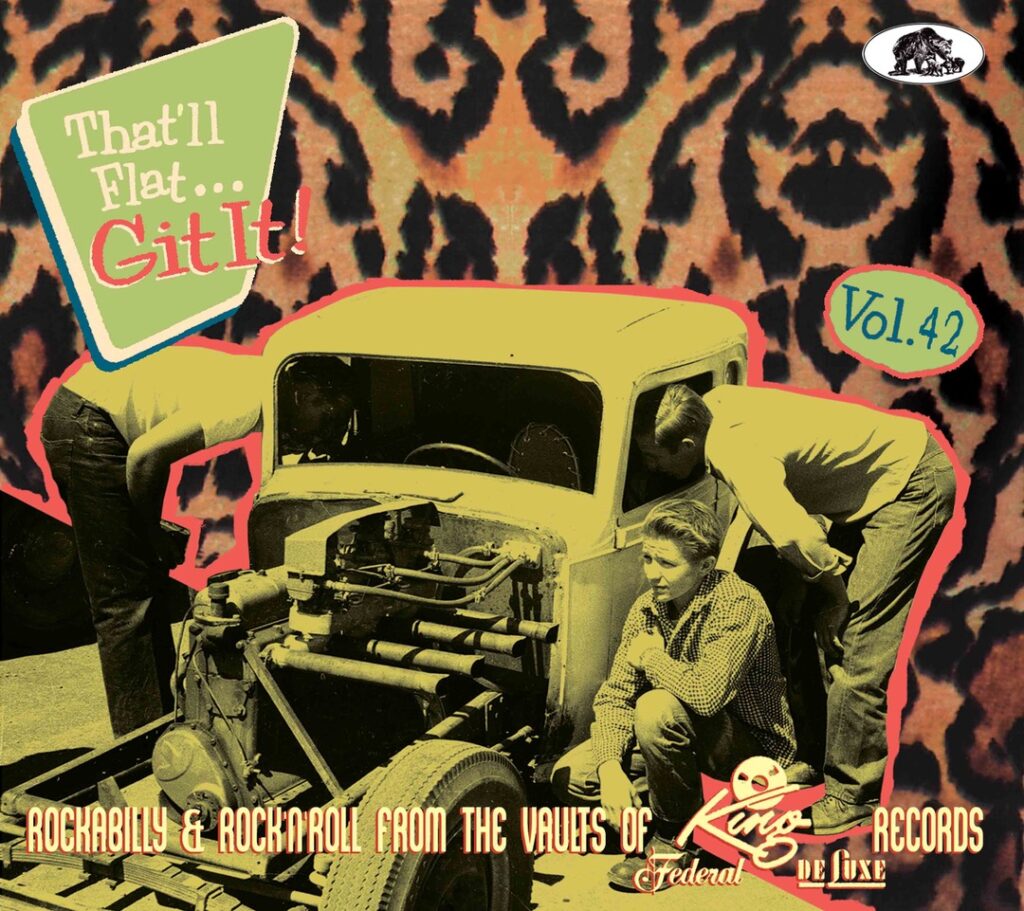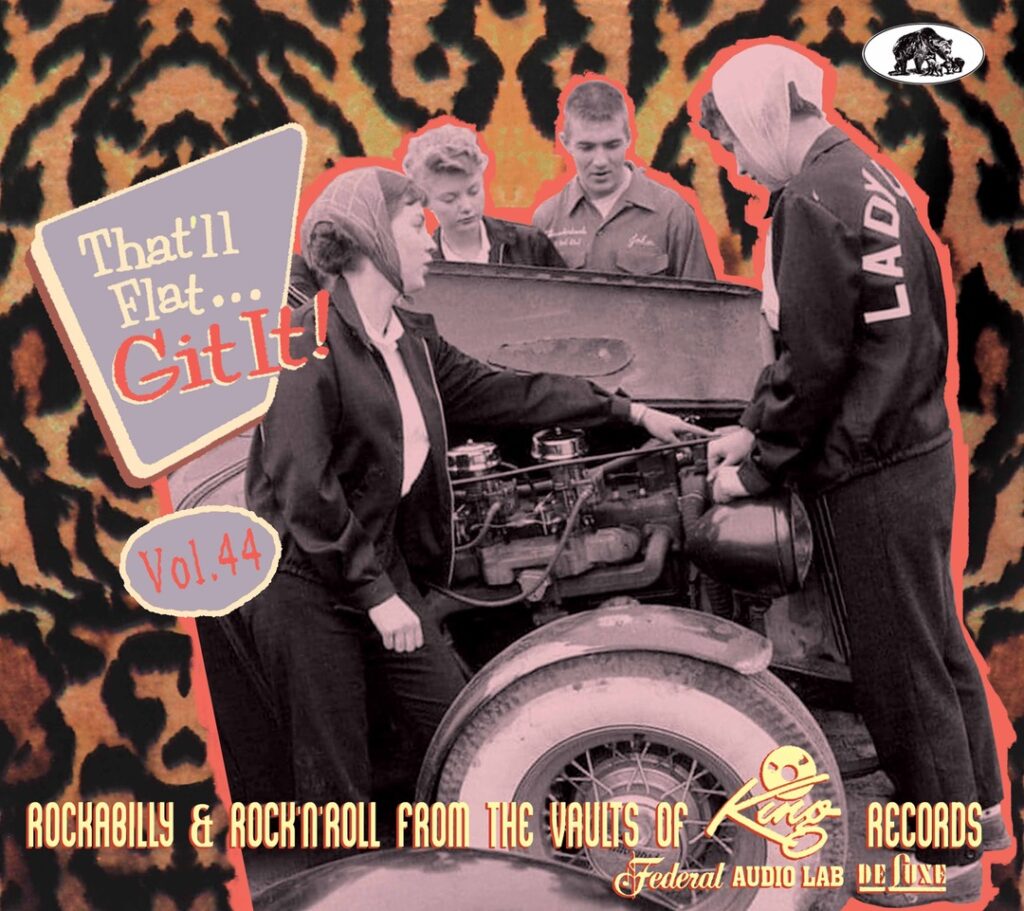Elvis Presley’s return to prominence after a multi-year slump began with a December 1968 TV special and arguably culminated in January 1973 with another television event: Aloha from Hawaii via Satellite, a concert that aired live in countries around the world and was seen by hundreds of millions of people, if not the billion or more that his manager, Colonel Tom Parker, claimed. The show resulted in a double album that became Presley’s last U.S. chart-topper.
That recording has been reissued and expanded upon before now. A two-CD “Legacy Edition” in 2013 offered a new mix; five tracks from a 3 a.m. post-show recording session; and a dress rehearsal from the previous night that Presley taped with a live audience in case of technical difficulties with the satellite broadcast. The rehearsal also surfaced in 1998 as The Alternate Aloha, and a 1978 compilation called Mahalo from Elvis incorporated the five late-night tracks.
A new 50th-anniversary box, though, goes further than the earlier releases, delivering almost everything but the Graceland kitchen sink on three CDs and a Blu-ray. It includes new mixes of Presley’s entire Jan. 14, 1973, performance; the dress rehearsal; and 16 tracks from the aforementioned post-concert session. Most significantly, the set features the first-ever release on disc of the concert film, which was NBC’s highest-rated program of 1973, as well as video of the rehearsal show and the 3 a.m. session. All of this is offered with 5.1 surround sound. Though, given the age of the material, the picture is, of course, not widescreen.
The years following this concert would be marked by divorce, drugs, decline, and death, but when he took the stage in Honolulu in 1973, Presley still had what it took to wow his audiences. He featured some of his early hits, including “Hound Dog,” “Love Me,” “Blue Suede Shoes,” “A Big Hunk o’ Love,” and “Can’t Help Falling in Love,” plus such seminal rock classics as “Blue Suede Shoes,” “Johnny B. Goode,” and “See See Rider.” The primary focus, though, seems to have been on updating his repertoire, which he did with considerable success.
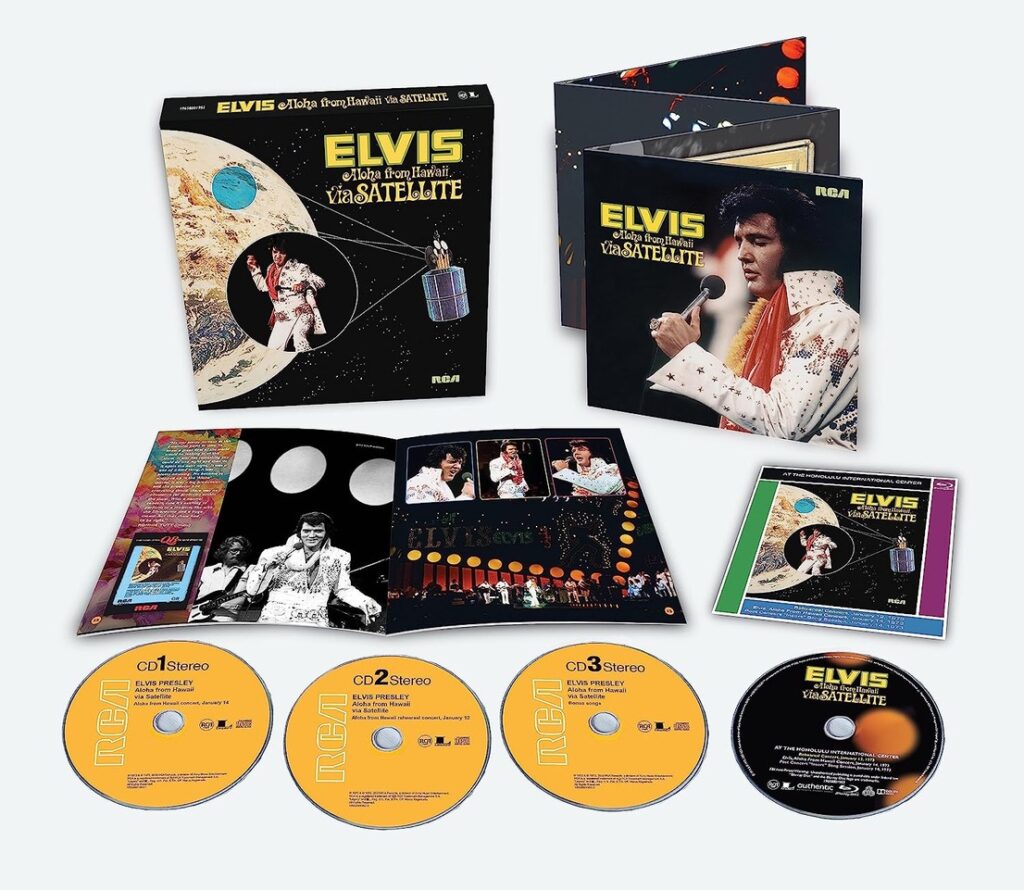
Presley offered his comeback hits, 1969’s “Suspicious Minds” and “Burning Love,” as well as covers of tunes like George Harrison’s “Something,” Don Gibson’s “I Can’t Stop Loving You,” and Hank Williams’s “I’m So Lonesome I Could Cry,” which he introduced as “probably the saddest song I’ve ever heard.” He also performed James Taylor’s “Steamroller Blues” and Mickey Newbury’s “An American Trilogy” medley, the Aloha versions of which were both later released as singles. Surprisingly, he didn’t deliver “Blue Hawaii,” though that number does show up in rehearsal takes in this box, as do “Hawaiian Wedding Song” and “I’ll Remember You,” the latter by Hawaiian composer Kuiokalani Lee.
Make no mistake: this is not the same Elvis who burst onto the scene with groundbreaking rock and roll in the late 1950s and early/mid-1960s. By the time he performed this Honolulu gig, he had spent years in Hollywood and Las Vegas, and his shows had turned into spectacles that featured elaborate costuming and stage design, a big band, numerous backup singers, and a 30-piece orchestra. His concerts began with a snippet from Richard Strauss’s “Also sprach Zarathustra” (aka the theme from the film 2001: A Space Odyssey) and incorporated MOR, sometimes saccharine ballads like Marty Robbins’s “You Gave Me a Mountain,” the Paul Anka-coauthored “My Way,” and the Newbury medley.
That said, Presley sings as well as ever in the Hawaiian concert and seems fully engaged with the material, which includes some songs that you can’t find in other live releases. If you’re a fan, this new edition of Aloha from Hawaii is a good bet.
Also Noteworthy
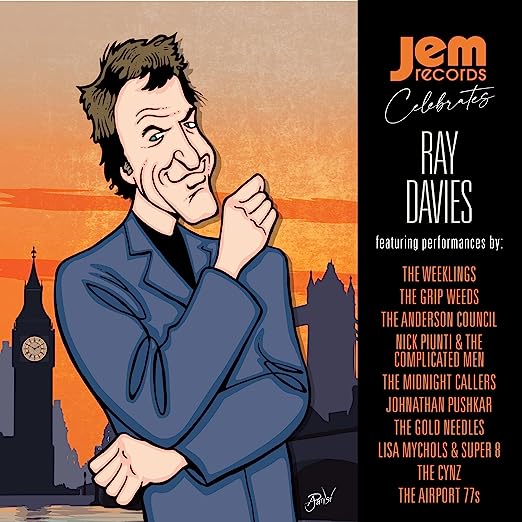
Various artists, Jem Records Celebrates Ray Davies. This is the latest album in a series that has embraced tributes to artists like Brian Wilson and Pete Townshend by acts signed to the New Jersey–based Jem Records label. The CD focuses on Kinks prime mover Ray Davies and includes high-energy contributions—many seemingly rooted in punk and new wave – from such bands as the Midnight Callers, the Anderson Council, and the Grip Weeds. The 13-track program makes room for a few of the Kinks’ hits (“Lola,” “Days,” “Come Dancing,” “Till the End of the Day”) but winningly performed deep cuts predominate.
Various artists, That’ll Flat … Git It! Vol. 42 & 44. Sun Records is probably the first label that comes to mind when you think of rockabilly and early rock ’n’ roll, but it had no monopoly on the genres: notable sides issued from lots of other companies – enough, in fact, to fill 44 packed volumes (so far) in a well-annotated CD series called That’ll Flat…Get It!. (The series, which the Bear Family label launched in 1992, garners its name from the catchphrase of legendary rockabilly DJ Dewey Phillips.) These two recent releases – which respectively contain 30 and 31 tracks – feature material from Cincinnati’s pioneering King label, as well as some tracks from Federal, DeLuxe, and Audio Lab. They include such acts as rockabilly star Mac Curtis; singer, songwriter, and pianist Moon Mullican; Dave Dudley, who went on to fame in country music; the influential Charlie Feathers; and Bruce Channel, who later had a No. 1 hit with “Hey, Baby!”
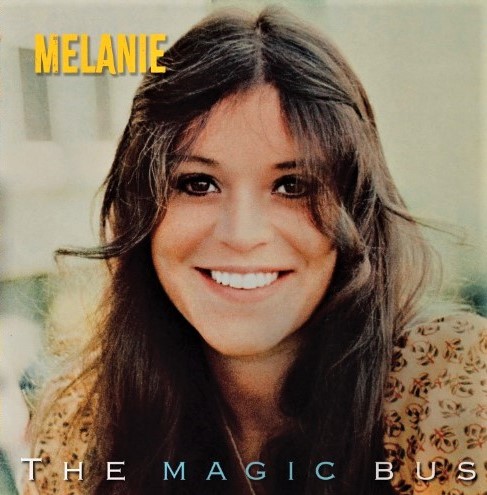
Melanie, The Magic Bus. Folk/pop singer Melanie was at the height of her popularity in April 1972 when she made the radio appearance on Miami’s WBUS (aka The Magic Bus) that is preserved here. She had performed at the 1969 Woodstock festival and scored a Top 10 hit with her song about the event, 1970’s “Lay Down (Candles in the Rain).” She’d also topped the charts with 1971’s “Brand New Key.” Somewhat surprisingly, she performs neither of these songs during her WBUS set, though the program ends with the DJ playing the recorded version of “Lay Down.” She does, however, sing “Any Guy,” an amiable albeit commercially unsuccessful single, as well as “Ring the Living Bell,” which became a Top 40 hit in 1972, and eight other numbers. The bits of conversation interspersed between the tracks are worth hearing only once, if at all: Melanie giggles a lot but doesn’t offer much in the way of memorable insights. The music, though, is well-sung and should please anyone who likes her work.
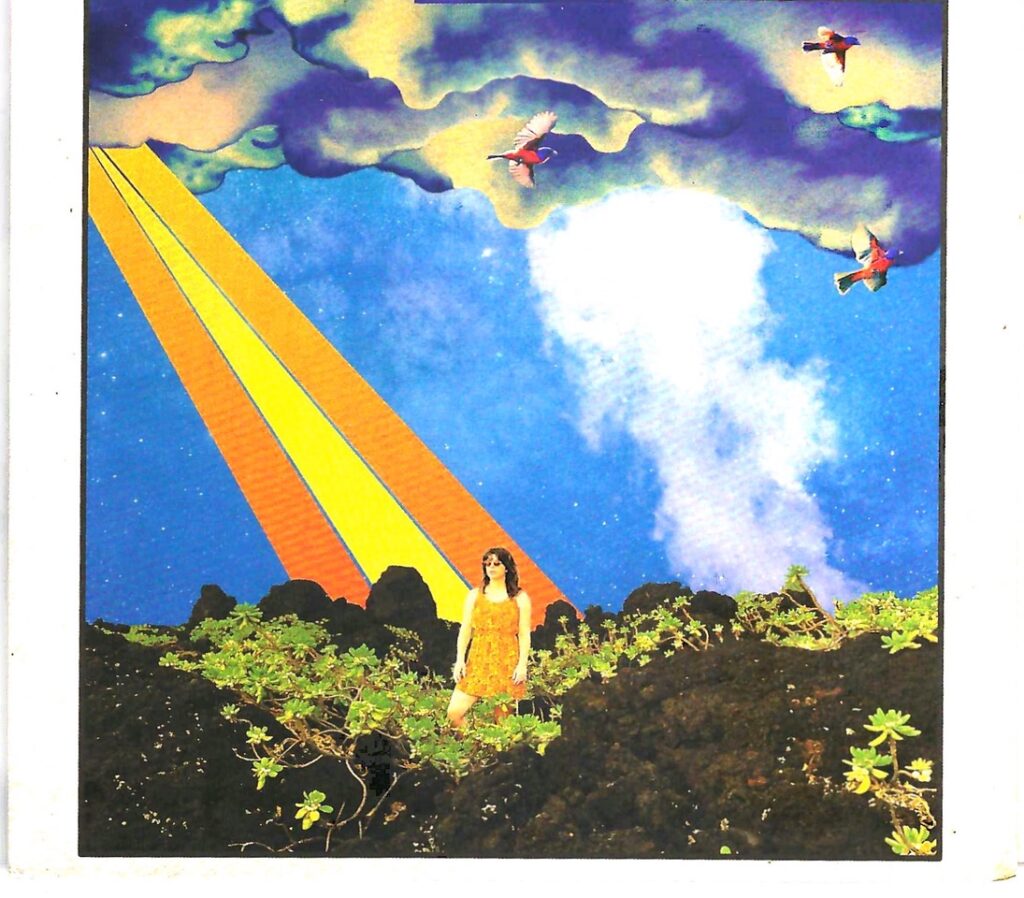
Beth Bombara, It All Goes Up. Folk/pop singer and songwriter Beth Bombara hails from Missouri and It All Goes Up is a new album, but its music sounds as if it comes straight from Southern California’s Laurel Canyon scene of the late 1960s and 1970s. The songs are all gently delivered, with Bombara’s sweet vocals backed by atmospheric instrumentation. The lyrics are introspective but not abstruse: in “Lonely Walls,” for example, she’s clearly referencing the pandemic when she sings, “I’m still waiting for the sun to shine / for the world to return to something I recognize.”
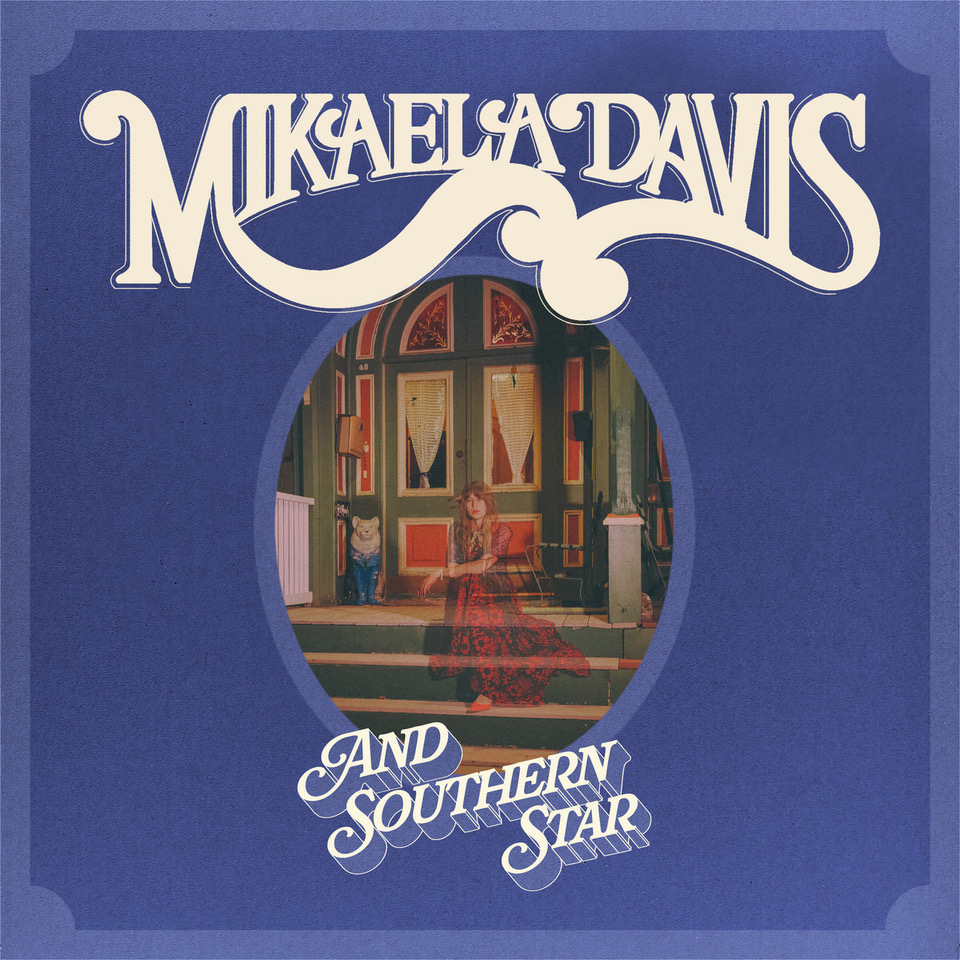
Mikaela Davis, And Southern Star. Mikaela Davis marches to the beat of her own drummer or, more accurately, her own harp, an instrument that rarely occupies center stage on rock-rooted LPs. Davis has covered other artists’ material – notably such Grateful Dead tracks as “Dark Star” and “Brokedown Palace” – but this album focuses on songs written by her and her band, Southern Star. Much like Beth Bombara’s record (see above), Davis’s set harkens back to the West Coast folk/rock scene of earlier decades. Apparent influences on the soothing, richly textured music include everything from psychedelia to 1960s’ so-called “girl groups.”
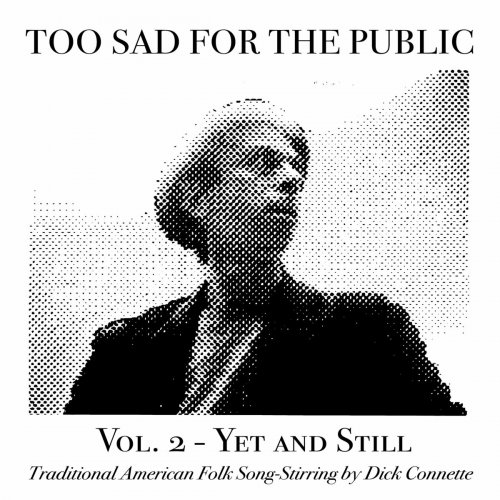
Too Sad for the Public, Vol. 2 — Yet & Still. If Cowboy Junkies sang material from Harry Smith’s classic Anthology of American Folk Music, it might sound something like portions of this inventive album. The brainchild of Dick Connette, founder of the independent StorySound Records, Too Sad for the Public benefits from a coterie of talented musicians, most notably folk singer Ana Egge, who shines on understated readings of Elizabeth Cotton’s “Shake Sugaree” and the traditional “Railroad Bill.” Other highlights include “Hey Now, Pt 1” a brassy nod to New Orleans jazz, and the three-part “Uncle Bunting,” which employs everything from a string quartet to trombone and is based on a 1923 recording by Uncle Bunt Stephens, whose work appears on the Smith anthology.
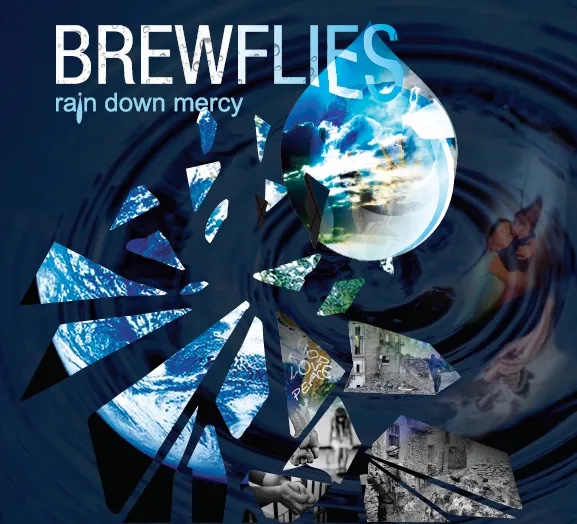
Brewflies, Rain Down Mercy. Brewflies formed back in 1994 but the group’s members worked together on assorted projects even before that. Originally an acoustic bluegrass trio, the band has evolved into a quartet that mixes elements of that genre with folk, country, rock, and Americana. Like Brewflies’ other recent releases, this one relies primarily on well-chosen covers, including the title cut from Bob Dylan’s underrated New Morning, Woody Guthrie’s “I Ain’t Got No Home,” Stephen Stills’s “For What It’s Worth,” John Fogerty’s “Fortunate Son,” John Lennon and Paul McCartney’s “Wait,” Iris DeMent’s “My Life,” and Robbie Robertson’s “The Rumor.” The program also makes room for three songs written or co-written by folk/pop singer/songwriter Michael Veitch, a frequent collaborator. Not everything here is revelatory, but there are more than a few highlights, starting with a spirited, accordion-spiced reading of Bruce Springsteen’s “Johnny 99” and an effusive rendition of Mary Gauthier’s “Mercy Now.”
Jeff Burger’s website, byjeffburger.com, contains five decades’ worth of music reviews, interviews, and commentary. His books include Dylan on Dylan: Interviews and Encounters, Lennon on Lennon: Conversations with John Lennon, Leonard Cohen on Leonard Cohen: Interviews and Encounters, and Springsteen on Springsteen: Interviews, Speeches, and Encounters.


